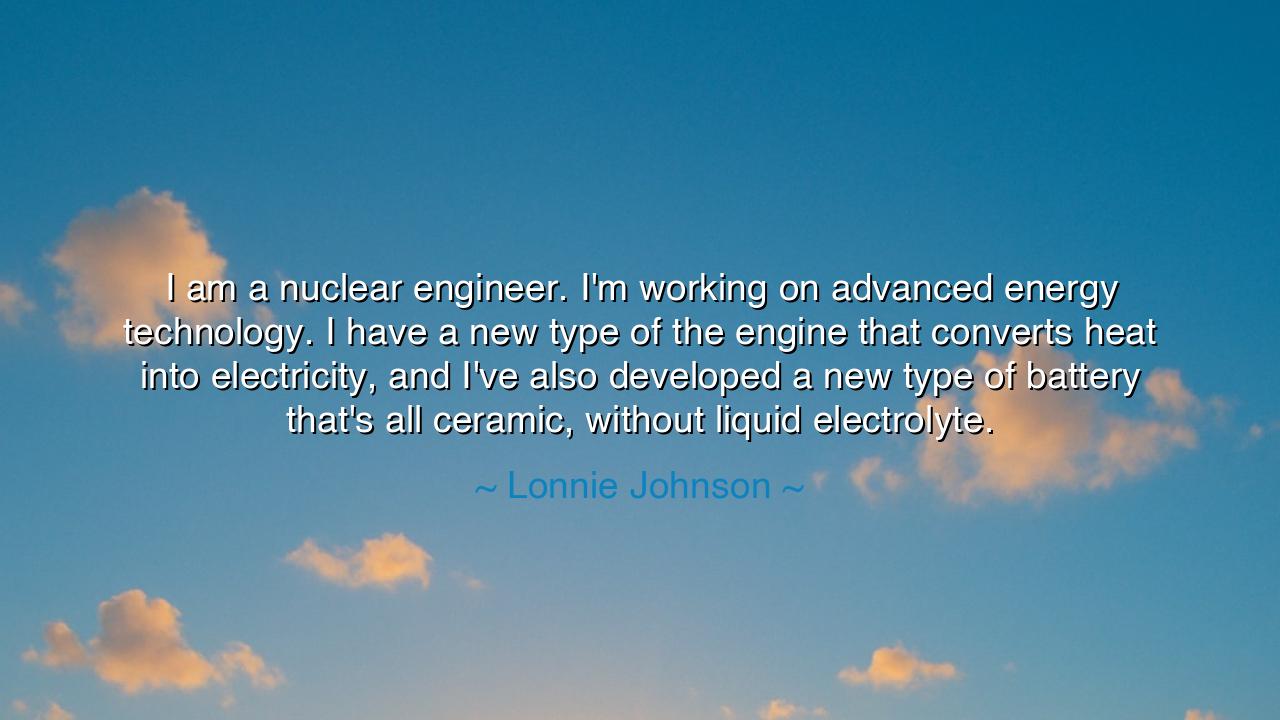
I am a nuclear engineer. I'm working on advanced energy
I am a nuclear engineer. I'm working on advanced energy technology. I have a new type of the engine that converts heat into electricity, and I've also developed a new type of battery that's all ceramic, without liquid electrolyte.






Hear the words of Lonnie Johnson, who once declared: “I am a nuclear engineer. I’m working on advanced energy technology. I have a new type of engine that converts heat into electricity, and I’ve also developed a new type of battery that’s all ceramic, without liquid electrolyte.” These are not merely the words of an inventor, but the proclamation of a seeker who peers into the hidden furnaces of creation and dares to bind their fire for the good of mankind. In these words lies the echo of Prometheus, who brought fire to mortals, not for destruction, but for light, warmth, and progress.
In Johnson’s voice resounds the eternal striving of humanity—the hunger to grasp the unseen and to shape it into tools of renewal. To declare oneself a nuclear engineer is to admit kinship with the stars themselves, for what is nuclear fire if not the power that burns within the heart of suns? And to work on advanced energy technology is to serve the greatest calling of our age: to draw forth endless power from the fabric of nature, not for conquest, but for life. His engine, which turns heat into electricity, is a testament to the ancient dream that no flame, no motion, no force of the earth should be wasted, but all transformed into strength for civilization.
The invention of a ceramic battery, free of the perils of liquid, is no small feat. Here lies the vision of endurance and purity—ceramic, a material of earth and fire, solid and steadfast, chosen to replace the fragile, volatile fluids that once restrained us. It is a symbol of permanence in an age of fleeting devices. By removing the dangers of liquid electrolyte, Johnson did not merely craft a better battery; he forged a promise of safety, longevity, and independence from the weaknesses of old.
Consider, children of the future, the story of James Watt, who in the 18th century refined the steam engine and gave rise to the Industrial Revolution. His mastery of turning heat into mechanical power did not merely build machines—it transformed the destiny of nations, expanding trade, empowering industry, and ushering humanity into a new era. In Johnson’s quest, we see a parallel path: just as Watt bent steam to the will of man, so too does Johnson bend the hidden fires of nuclear energy, the secrets of advanced batteries, and the flow of electricity to carve a way forward for our age.
But let us not be deceived—such work is not easy, nor is it without sacrifice. The road of invention is paved with nights of failure, years of obscurity, and countless doubts. Yet the one who endures, the one who refuses to bury his vision, becomes the benefactor of generations unborn. Thus it was with Edison and the light bulb, with Curie and the discovery of radioactivity, with Johnson and his pursuit of a safer battery and a more efficient engine. These men and women teach us that greatness lies not in avoiding struggle, but in transforming it into breakthroughs that serve all humanity.
From these words and deeds, a lesson emerges: do not shy away from your gift, nor belittle the vision placed within you. If you are called to create, create boldly; if you are called to innovate, innovate with wisdom. The path of Johnson teaches us that the world does not advance by those who wait timidly, but by those who labor, fail, and rise again, carrying their fire until it ignites the world. To those who doubt, remember: every light you see around you was once the dream of a single soul.
So, take action. Seek knowledge with relentless heart. Sharpen your skills as the smith sharpens his blade. Do not bury your talent in the earth, but set it aflame to illuminate the lives of others. Whether your craft is in science, in art, in teaching, or in leadership—let it be guided by the same spirit that moved Johnson: to bring forth advanced technology, not for pride, but for the strengthening of the human family. In this, you too become a builder of ages, a custodian of progress, and a servant of destiny.
Thus, let the words of Lonnie Johnson be a torch in your memory. For he did not merely say, “I am a nuclear engineer”—he declared that he was a steward of tomorrow, a bearer of fire who sought to transform it into light. May you, too, find within your craft the courage to proclaim not only what you are, but what you are building for the generations yet to come. For this is the true nobility of invention: to labor today that others may live better tomorrow.






AAdministratorAdministrator
Welcome, honored guests. Please leave a comment, we will respond soon